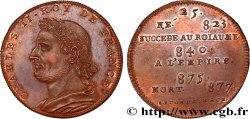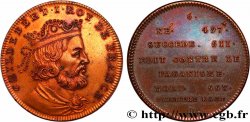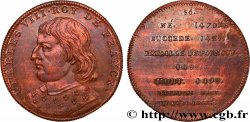E-auction 78-39012 - fjt_339282 - SÉRIE MÉTALLIQUE DES ROIS DE FRANCE Règne de PHILIPPE AUGUSTE - 41 - frappe d’origine, légère n.d.
Devi Sign-in ed essere un offerente approvato fare un'offerta, Login per fare offerte. Conti sono soggetti ad approvazione e di approvazione sono raggiunti entro 48 ore. Non aspettare fino al giorno di una vendita si chiude per registrarti.Confermando la tua offerta su questo oggetto ti impegni ad un contratto legalmente vincolante per l'acquisto di questo prodotto e fare clic su «offerta» costituisce accettazione dei termini di utilizzo de e-auctions cgb.fr.
Offerta deve essere collocato in euro gli importi interi vendita only.The si chiuderà al momento sulla descrizione dell'oggetto, eventuali offerte pervenute al sito dopo l'orario di chiusura non verranno eseguite. Volte transmition possono variare e le offerte potrebbero essere respinto se si attende per gli ultimi secondi. Per ulteriori informazioni ckeck le FAQ.
SENZA COSTI PER GLI ACQUIRENTI.
SENZA COSTI PER GLI ACQUIRENTI.
| Valutazione : | 28 € |
| Prezzo : | 7 € |
| Offerta maxima : | 7 € |
| Data di fine vendita : | 13 ottobre 2014 15:00:00 |
| partecipanti : | 3 partecipanti |
Tipo : Règne de PHILIPPE AUGUSTE - 41 - frappe d’origine, légère
Data: n.d.
Metallo : rame rosso
Diametro : 32 mm
Asse di coniazione : 12 h.
Peso : 11,80 g.
Orlo : cannelée
Grado di rarità : R1
Diritto
Titolatura diritto : PHILIPPE II ROY DE FRANCE.
Descrittivo diritto : Buste imaginaire portant bonnet et drapé à droite.
Rovescio
Titolatura rovescio : 41 - NÉ 1165 - SUCCEDE 1180 - SECONDE CROISADE DES ROIS DE FRANCE EN TERRE SAINTE 1190 - BATAILLE DE BOUVINES 1214 - MORT 1223 - TROISIEME RACE / P..
Descrittivo rovescio : en huit lignes.
Commento
Philippe II dit Philippe Auguste, né le 21 août 1165 à Gonesse, mort à Mantes le 14 juillet 1223, est le septième roi de la dynastie dite des Capétiens directs. Il est le fils héritier de Louis VII dit le Jeune et d'Adèle de Champagne.
Le surnom d'« Auguste » lui a été donné par le moine Rigord après que Philippe II a ajouté au domaine royal en juillet 1185 (Traité de Boves) les seigneuries d’Artois, du Valois, d’Amiens et une bonne partie du Vermandois. Ce terme n'est pas une référence à l'empereur romain, mais signifie qu'il a accru considérablement le domaine.
Chapelain et biographe de Philippe II, Guillaume le Breton le nomme « Philippe le Magnanime » dans sa chronique La Philippide rédigée entre 1214 et 1224. Cette chronique est une continuation de celle de Rigord que Philippe II lui avait demandé d'expurger, la jugeant moins laudatrice qu'il le souhaitait.
Philippe Auguste reste l'un des monarques les plus admirés et étudiés de la France médiévale, en raison non seulement de la longueur de son règne, mais aussi de ses importantes victoires militaires et des progrès essentiels accomplis pour affermir le pouvoir royal et mettre fin à l'époque féodale.
Pour la suite de la biographie, voir http://fr.wikipedia.org/wiki/Philippe_II_de_France.
Philip II, known as Philip Augustus, born on August 21, 1165 in Gonesse and died in Mantes on July 14, 1223, is the seventh king of the dynasty known as the direct Capetians. He is the son and heir of Louis VII, known as the Younger, and Adèle of Champagne..
The nickname \\\"Augustus\\\" was given to him by the monk Rigord after Philip II added to the royal domain in July 1185 (Treaty of Boves) the lordships of Artois, Valois, Amiens and a good part of Vermandois.. This term is not a reference to the Roman emperor, but means that he greatly increased the domain.
Chaplain and biographer of Philip II, William the Breton calls him “Philip the Magnanimous” in his chronicle La Philippide written between 1214 and 1224. This chronicle is a continuation of that of Rigord which Philip II had asked him to expurgate, judging it less laudatory than he wished..
Philip Augustus remains one of the most admired and studied monarchs of medieval France, due not only to the length of his reign, but also to his significant military victories and the essential progress made in strengthening royal power and ending the feudal era..
For the rest of the biography, see http://fr. Wikipedia. org/wiki/Philippe_II_de_France
Le surnom d'« Auguste » lui a été donné par le moine Rigord après que Philippe II a ajouté au domaine royal en juillet 1185 (Traité de Boves) les seigneuries d’Artois, du Valois, d’Amiens et une bonne partie du Vermandois. Ce terme n'est pas une référence à l'empereur romain, mais signifie qu'il a accru considérablement le domaine.
Chapelain et biographe de Philippe II, Guillaume le Breton le nomme « Philippe le Magnanime » dans sa chronique La Philippide rédigée entre 1214 et 1224. Cette chronique est une continuation de celle de Rigord que Philippe II lui avait demandé d'expurger, la jugeant moins laudatrice qu'il le souhaitait.
Philippe Auguste reste l'un des monarques les plus admirés et étudiés de la France médiévale, en raison non seulement de la longueur de son règne, mais aussi de ses importantes victoires militaires et des progrès essentiels accomplis pour affermir le pouvoir royal et mettre fin à l'époque féodale.
Pour la suite de la biographie, voir http://fr.wikipedia.org/wiki/Philippe_II_de_France.
Philip II, known as Philip Augustus, born on August 21, 1165 in Gonesse and died in Mantes on July 14, 1223, is the seventh king of the dynasty known as the direct Capetians. He is the son and heir of Louis VII, known as the Younger, and Adèle of Champagne..
The nickname \\\"Augustus\\\" was given to him by the monk Rigord after Philip II added to the royal domain in July 1185 (Treaty of Boves) the lordships of Artois, Valois, Amiens and a good part of Vermandois.. This term is not a reference to the Roman emperor, but means that he greatly increased the domain.
Chaplain and biographer of Philip II, William the Breton calls him “Philip the Magnanimous” in his chronicle La Philippide written between 1214 and 1224. This chronicle is a continuation of that of Rigord which Philip II had asked him to expurgate, judging it less laudatory than he wished..
Philip Augustus remains one of the most admired and studied monarchs of medieval France, due not only to the length of his reign, but also to his significant military victories and the essential progress made in strengthening royal power and ending the feudal era..
For the rest of the biography, see http://fr. Wikipedia. org/wiki/Philippe_II_de_France








 Segnalare un errore
Segnalare un errore Stampate la pagina
Stampate la pagina Condividi mia selezione
Condividi mia selezione Fai una domanda
Fai una domanda Consegnare / vendere
Consegnare / vendere
 Descrittivo
Descrittivo









